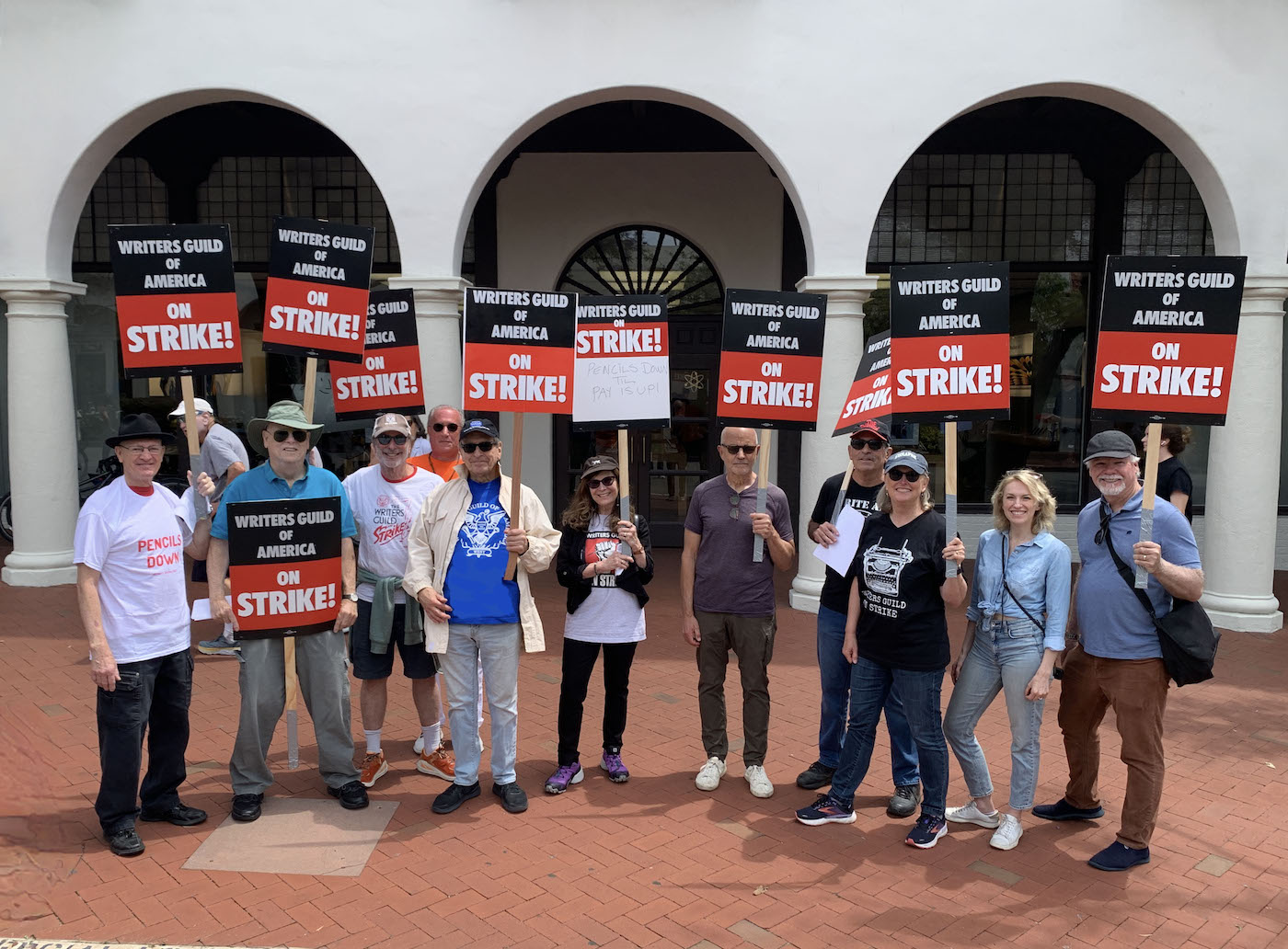The WGA Strike Comes to Santa Barbara

On Saturday, two of the great creative forces in my life came into conflict when I gathered with 12 veteran members of the Writers Guild of America West (WGA) for an informational picket line outside the Apple Store on State Street. Since 1987, when I bought my first Mac, all of the pages of investigative reporting I’ve written, every screen- or teleplay and, since 9/11, all of my books on counter-terrorism and true crime, have been created on devices born from the genius of Steve Jobs.
But this strike, now in its 59th day – my third strike since joining the Guild 36 years ago – threatens the very existence of a profession that has filled screens (large and small) for a century with what Dashiell Hammett, through the voice of Humphrey Bogart, metaphorically called: “The stuff that dreams are made of.”
Since our last 100-day work stoppage in 2007-08, the streaming space has grown exponentially. Instead of 22 hours a year of broadcast network one-hour dramas or 30-minute sitcoms, there are shorter, eight- to 10-hour seasons of binge-worthy series, consumed by viewers on a multitude of platforms.
But this time, instead of giving the hardworking members of “writers’ rooms” a pay scale in line with the billions of “clicks” that hit series on Netflix, Amazon Prime, Apple+, or Max now generate, the producers have demanded fewer writers and more limited “seasons.”
Apart from their insistence on smaller “rooms” – the cauldrons where these critically acclaimed series are created – and threats of using AI to spit out stories to be “polished” by show-runners, central to the strike is the issue of residuals, the “back end” that kept many writers afloat in the lean years, when the lion’s share of viewership came from broadcast television and cable. Now, in the streaming sphere, they don’t exist.
In fact, the WGA’s negotiations with the Alliance of Motion Picture and Television Producers (AMPTP) broke down when the AMPTP refused to even counter our proposal for Streaming Residuals. They argued that because the delivery system has changed and (despite billions of “clicks”) there was no “back end.” At the same time, they were utterly opaque in revealing just how many billions of dollars they’re grossing – particularly worldwide.
Go to the credits on any major streaming series and you’ll see that it’s been translated into a dozen languages for the global market. As for the delivery system, consider this: if you go to a restaurant on Coast Village Road and sit down to a great meal, the ingredients cost the same and the food requires the identical skill to prepare as it would if you ordered online and the meal was delivered to your home via Grubhub or DoorDash.
But the AMPTP has been inflexible on this point, and it’s clear, even without internal data on their gross income, that the streamers can well afford to settle all of this tomorrow. A chart on my website (http://peterlance.com/wordpress/?p=16789) on executive compensation (compiled by The Hollywood Reporter) shows that 11 of the top studio/streaming execs grossed a combined $324.2 million last year – nearly 1/3 of that by Netflix’s Reed Hastings, Ted Sarandos, and Greg Peters.
In contrast, the total cost of WGA proposals that would end the strike immediately is $429 million a year, spread across the Guild’s 11,500 members – a number representing less than one percent of each studio’s revenue.
But the AMPTP’s insistence that writers’ income be reduced to that of gig workers, isn’t the biggest threat to the production of film and TV as you’ve come to know it. By dismantling “writers’ rooms” and insisting that WGA members spend fewer weeks in the writing, production, and post-production of series, they are disrupting the very apprentice system that allows a Staff Writer to graduate to Showrunner. Without it, the craft of producing for the small screen – traditionally a writer’s medium – could be lost.






